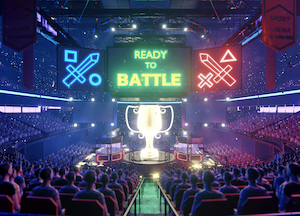Esports: The ultimate career or an industry in need of change?

From a niche pastime just a decade ago to a global market now worth an estimated $1.4bn, the esports sector has been on an outstanding growth trajectory in a short space of time.
With tournaments regularly attracting global audiences in the millions, professional players earning big money and entire esports facilities being built for both professional and educational use, the interest in esports shows no signs of abating.
While Asia and North America have traditionally dominated the sector, Europe and specifically the UK are now catching up, attracting global leagues such as League of Legends’ MSI, Apex Legends’ ALGS and Rocket League, and bringing with them huge revenue opportunities.
While these leagues tend to grab the headlines, the true innovation in esports largely happens behind the scenes, with some of the most groundbreaking and innovative technology available helping to create unique, engaging experiences for players and fans.
Take the example of Riot Games’ Project Stryker remote broadcast centres that receive live broadcast feeds from competitions to produce, broadcast and translate content for millions of esports fans around the world. The first centre in Dublin, Ireland, is home to broadcast production, engineering, event, sound and graphic design professionals, and features AR/XR sound stages, multi-purpose insert studios, production control rooms, and replay and editing suites all designed to deliver multiple events in multiple languages across the globe.
With more investments of a similar scale already in the pipeline, the esports opportunity is undoubtedly huge and the skilled professionals needed to build and manage them are clearly in demand. However, the industry is facing a significant challenge in terms of a lack of talent. In a field where technology is enhancing at pace, with AR, VR, IoT, 3D animation, data analysis, remote production and programming all playing a role, finding people with the relevant skills at the relevant level can be difficult. This has particularly been the case over the past few years when the Covid pandemic led to a huge increase in demand for esports content. While the consensus seems to be that the industry is currently undergoing something of a recalibration as that boom passes, industry consolidation slows and economic uncertainty spreads, developers, engineers and designers continue to be in demand. The same is true across C-suite positions, where strategic roles can be hard to fill as senior roles begin to emerge in what is still a young industry.
Esports education
Although not a quick fix to the issues around talent, the UK is leading the way in terms of esports education, with specific undergraduate and postgraduate degrees available, as well as a BTEC qualification in association with the British Esports Federation. Perhaps more surprisingly, students, educators and parents all seem to be in consensus that esports should also be taught in schools, largely due to the transferable skills it requires and the job opportunities available.
Certainly any opportunity afforded to young people to explore the esports opportunity seems to be received with enthusiasm. In the UK, there are now more than 200 games-related courses on offer at undergraduate level. Indeed, a whole collegiate community has also formed around this, with organisations such as NUEL and NSE staging events for tens of thousands of attendees from more than 100 universities.
The attraction for players is clear, the top earning British esports player in 2022 generated almost $350,000, while the top player globally earned more than $7 million. Who wouldn’t want to do something they love that also brings with it major earning opportunities?
Diversity in esports
With so much growth and investment in recent years, it’s perhaps sensible to think that esports uptake may be reaching its peak, but the opportunities for further developments are clearly visible.
Last month’s Asian Games marked the first time esports have been included as a medal discipline at a major sports competition, and it looks likely it will also be present at the 2028 Olympics too. This may not be without its own challenges, though. When the official Olympics organising committee announced the Olympic Esports Series in March 2023 it focused on virtual sport simulation games over established esports titles, showing a lack of understanding of the sector and the skill involved in becoming world leading players.
This convergence of sport and esport could, however, pave the way for more audience growth, and perhaps help to overcome one key concern around esports – its lack of diversity.
Both in terms of those competing in esports and those behind the scenes, the industry is overwhelmingly white and male. According to a survey by the International Game Developers Association, only 2% of game developers identify as Black or African American, and 5% identify as Hispanic or Latinx. With representation such a huge issue in so many sectors, it’s perhaps not surprising that if people don’t see themselves in a game, they don’t rush to play it, which makes increasing diversity behind the scenes even more important.
A number of initiatives are making progress here, including Women in Esports and AnyKey. Targeted recruitment and retention strategies also have a role to play in attracting talent from under-represented communities, as do offering internships and working with universities and colleges to demonstrate clear career paths, something that needs to happen on a much bigger scale.
While esports has come a long way, such growth does bring challenges, from organisations trying to jump on the bandwagon to a limited talent pool, over investment and a lack of diversity. Despite this, all the signs are that the sector will continue to thrive, creating huge opportunities for careers in front of and behind the screen.
Martin Tripp Associates is a specialist executive search consultancy. We work globally across the media, information, technology and entertainment sectors, and with some of the world’s biggest brands on communications, digital, marketing and technology roles. Feel free to contact us to discuss.